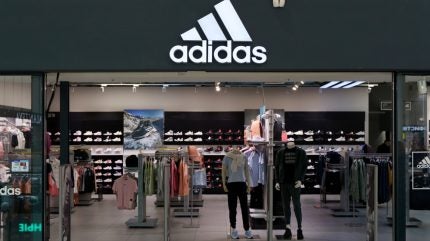
During an Adidas earnings call with investors for its recent Q2 results the brand was quizzed on its July trading and whether or not its recent SL72 campaign had any impact.
To which the brand replied: “The mistake we made on SL72 has had no impact on current trading neither in general or on the model itself.”
What was the Adidas SL72 marketing campaign?
Adidas recently relaunched its SL72 shoes as part of a series to revive classic trainers (sneakers). The brand chose to work with supermodel Bella Hadid to promote its SL72 shoe in July, which was first launched to coincide with the 1972 Olympics.
The images of the US model wearing the shoes was faced with criticism on X (formerly Twitter) including on Israel’s official account on X (formerly Twitter).
The official Israel account urged Adidas to comment on the model being used in the campaign being “half-Palestinian” after it stated eleven Israelis were murdered by Palestinian terrorists during the Munich Olympics.
Shortly afterwards Adidas removed supermodel Bella Hadid from an advertising campaign for the retro shoes that referenced the 1972 Munich Olympics.
Hadid has since spoken out on Instagram to share her shock and disappointment with the campaign with her stating in an Instagram story: “I would never knowingly engage with any art or work that is linked to a horrific tragedy of any kind.”
She claims she was unaware about the tragedy that took place during the 1972 Olympics but admitted she should have done more research beforehand and claims Adidas and her team should have done the same.
A previous statement from Adidas Originals on Instagram said connections to the 1972 attack were not intentional and the company apologised “for any upset or distress caused to communities around the world”.
Adidas SL72 marketing campaign lessons for wider fashion industry
During the investor call on 31 July Adidas suggested retro trainers remain an opportunity for the brand moving forward.
Adidas CEO Bjørn Gulden said: And then what you should not forget we said retro running is the next silo. We did it with SL 72. And yes, there was some noise, and we did some mistakes, but happy to report that the shoe is the best seller in retail and the volumes are really starting to grow.”
Apparel analyst Louise Deglise-Favre tells Just Style exclusively that “while the campaign and its subsequent handling has been heavily criticised by both Israeli and Palestinian supporters, it most likely won’t have any tangible effect on its overall sales due to the overwhelming popularity of some of its other models.”
However, she continues: “This controversy serves as a good reminder to brands that they need to be extra cautious with their campaigns and overall communications in the context of heightened geopolitical tensions”.
She urges fashion brands to ensure all campaigns are thoroughly reviewed from various cultural lenses before being rolled out to “avoid causing unintentional outrage”.
Adidas has been wise to tread carefully given the ongoing financial impact of its previous celebrity partnership with rapper Kanye West.
For example, the brand’s most recent Q2 results showed a 7.7% sales decline in North America, which GlobalData apparel analyst Alice Price attributed to the loss of its Yeezy products continuing to affect the brand’s desirability in the region.
Adidas terminated its Yeezy product partnership with West in October 2022 due to his antisemitic remarks and the brand said at the time it expected a €250m ($246.55m) loss on its net income in the short-term.
Gulden said at the time: “Although by far not good enough, 2023 ended better than what I had expected at the beginning of the year. Despite losing a lot of Yeezy revenue and a very conservative sell-in strategy, we managed to have flat revenues.”



